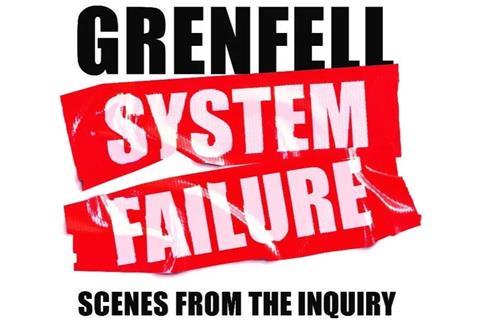Richard Norton-Taylor and Nicholas Kent’s recent play on the Grenfell Inquiry was well produced but failed to capture the community’s sense of anger, writes Emma Dent Coad

I wanted to have seen it, but I didn’t want to see it.
Grenfell: System Failure – Scenes from the Inquiry is the second of two plays by Richard Norton-Taylor and Nicholas Kent. Like its predecessor, it is based on the proceedings of the Grenfell Tower Inquiry, which ended last year and for which we are expecting the final report later this year.
After that, we hope, there will be some long-awaited police action and arrests. Though after nearly six long years and tens of millions of pounds spent on defence lawyers, nobody is holding their breath for that.
I’d seen the first play, Grenfell: Value Engineering, and for me it was pretty well done, painful and upsetting. The follow up was getting good reviews and numerous people told me I ‘should’ go. In the end a friend booked tickets and made me go. I lasted until the break, like last time. Same for my friend as it happened.
System Failure is so accurate it doesn’t feel like acting, which is good I guess. Though one could simply watch the relevant parts of the Inquiry online. I attended some sessions in person to support people I knew, including the Pickles session, but was alternatively so angry or so upset that it was almost intolerable.
And I’m still there on the council as a minority party councillor, watching and challenging the Tory council
Most important to me is my own history. I was there before the fire as a friend of some members of the Grenfell Action Group. I witnessed the fire in its unspeakable horror and I saw the utter failure of the council in the Royal Borough of Kensington and Chelsea (RBKC) to show any degree of care whatever.
I’d met many of the bereaved and survivors, and probably hundreds of seriously traumatised residents, in which I myself number. As Labour MP for Kensington from four days before the fire until December 2019, I also witnessed the well-practiced faux compassion, alongside the disdain and uncaring of several Tory Ministers and Secretaries of State, and a couple of Prime Ministers.
And I’m still there on the council as a minority party councillor, watching and challenging the Tory council as they continue to fail residents while they laugh and mock Labour councillors who deal with the outcomes of their failures every single day. So this was all very familiar to me.
We should bear in mind that these two plays showed beautifully re-enacted but very carefully selected scenes from the Inquiry. It is hardly neutral.
The council shares responsibility for the Grenfell Tower atrocity
My personal perspective and that of many of my neighbours is focused on screaming frustration at the continued failure of the council. Any council is there to implement government policy, but if they do not also mitigate, question and challenge guidance that is inappropriate, and lobby for policy change, then what on earth is the point of them?
The council shares shares responsibility for the Grenfell Tower atrocity, and hiding behind government failures to regulate the building and cladding industries does precisely nothing to mitigate this.
And this is why, as far as I’m concerned, local resident and playwright Nathaniel McBride’s play Dictating to the Estate is far more poignant and relevant. McBride’s documentary play delves into the psyche of the decision-makers based on years of council minutes and emails.
It follows the utterly reprehensible plans to socially cleanse the Silchester and Lancaster West estates by demolition and replacement with hideous pseudo-Georgian apartments and town houses. Those schemes proposed building over parks and shoveling council tenants into new blocks facing the Westway flyover - if indeed they were among the few allowed to return after a decade of construction.
The term ‘Dictating to the Estate’ came from a recorded meeting of a senior RBKC Tory councillor in charge of a development on his private family estate in Longniddry outside Edinburgh. The ‘estate’ ran a consultation in the village to discuss building luxury homes on prime arable land.
…the tribute that the Grenfell victims and their friends and families deserve, is justice
They reportedly stuck a few notices on lampposts and hoped no one would show up. However, the entire village rolled up to protest. The ‘son of the estate’ raised his voice shrieking (I heard a recording) ”the village will not dictate to the estate”.
McBride’s play invites us to consider how bringing these feudal attitudes into Kensington and Chelsea may have contributed to the emergence of a rotten culture and warped priorities that emerged within the council. It also uses actors of different ethnicities and gender regardless of whose words they portray. It is extremely powerful.
In a similar light, my book One Kensington is written from extensive contemporaneous notes taken by a witness (me) to council meetings over the years before, during and after the fire, revealing the mindset of those in charge of the appalling decision-making that lead to Grenfell in their own words.
Time Out responded thus to System Failure: “the cumulative effect is a bleakly one-dimensional play”. It should be said that if you knew a little about the background to the Grenfell Tower fire and wanted to understand more, the play undoubtedly filled gaps.
However, the tribute that the Grenfell victims and their friends and families deserve, is justice. I fear that we will be waiting a long time yet for this.
Also read >> Value Engineering: The new Grenfell play should be required viewing
Postscript
Grenfell: System Failure – Scenes from the Inquiry was edited by Richard Norton-Taylor and Nicholas Kent. The play’s London run has now ended.
Dictating to the Estate by Nathaniel McBride has been filmed and is considering venues for further screenings.
One Kensington by Emma Dent Coad is published by Quercus.
















No comments yet